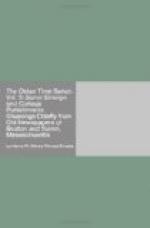“Last Wednesday Evening one Mr. ——, of this Town (Newport), was catched by a Number of Persons in Disguise, placed on an old Horse, and paraded through the principal Streets for about an Hour as a Warning to all bad Husbands.”
-------------------------
In the “Massachusetts Gazette,” Sept. 8, 1786, we find an account of the Dutch mode of executions.
NEW-JERSEY.
ELIZABETH-TOWN, Aug. 16. The little influence which our present mode of executing criminals has in deterring others from the commission of the same crimes, arises from a want of solemnity and terrifick circumstances on such occasions. It is not the mere loss of life which has so much a tendency to affect the spectator, as the dreadful apparatus, the awful preliminaries, which ought to attend publick executions; whose justifiable purposes is the prevention of crimes, and not the inflicting torment on the criminal. A variety of particulars might be adopted respecting the dress of the condemned, the solemnity of the procession to the place of execution, and the apparatus there, to throw horrour on the scene without in reality giving the unhappy victim a more painful exit. The Dutch have a mode of execution which is well calculated to inspire terror, without putting the sufferer to extraordinary pain. The criminal is placed on a scaffold, opposite to the gigantick figure of a woman, with arms extended, filled with spikes, or long sharpened nails, and a dagger pointed from her breast, she is gradually moved towards him by machinery for the purpose, till he gets within her embrace, when her arms encircle him, and the dagger is pressed through his heart. This is vulgarly called among them, kissing the Yssrow, or woman, and excites more terror in the breasts of the populace than any other mode of punishment.
-------------------------
Inhabitants of Boston severely punished (on paper) in April, 1774, for destruction of the tea.
A CURIOUS HISTORICAL ITEM. In a recent English Chronological work, under the article of “Tea,” we found the following brief notice of the American Revolution: “Tea destroyed at Boston by the inhabitants, 1773, in abhorrence of English Taxes; for which they were severely punished by the English Parliament, in April, 1774.”
Salem Observer, April 28, 1827.
-------------------------
Sentences of death for robbery, May 6, 1788.
The Mulatto who, some time since, robbed Mr. Bacon, on the Cambridge road, was, at the late term of the Supreme Court at Concord, convicted of the crime, and had sentence of death pronounced against him.
Thursday next is the day appointed
for the execution of the two
Taylors, for the robbery of
Mr. Cunningham, on Boston-Neck.
-------------------------
Captain Phillips, of the British army, whipped in New York in 1784.




